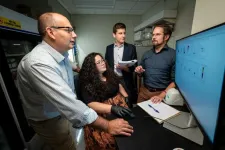(Press-News.org) Environmental regulators and other organizations should do more scientific experimentation to inform natural resource policy, according to an international group of economists that includes University of Wyoming researchers.
In a new paper in the prestigious journal Science, the economists say more frequent use of up-front experiments would result in more effective environmental policymaking in areas ranging from pollution control to timber harvesting across the world.
“Although formal experimentation is a cornerstone of science and is increasingly embedded in nonenvironmental social programs, it is virtually absent in environmental programs,” the researchers wrote. “Strengthening the culture of experimentation in the environmental community will require changes in norms and incentives.”
The paper acknowledges that scientists and practitioners can legitimately argue about how much time and effort should be given to experiments in environmental policy, but it contends that the current allocation of roughly zero percent is suboptimal.
The paper was produced by The Teton Group, an initiative led by Professor Todd Cherry, the John S. Bugas Chair in UW’s Department of Economics. The prominent group of economists meets every fall in Wyoming to discuss critical ideas that impact environmental policy and economic development. Members include colleagues from UW and internationally renowned scholars in behavioral environmental policy from Carnegie Mellon University, Johns Hopkins University, Purdue University, the University of Texas-Austin, the University of Wisconsin-Madison and several key European universities. The group of UW economists include Todd Cherry, Jacob Hochard, Stephen Newbold, Jason Shogren, Linda Thunström and Klaas van ’t veld.
“Guesswork is expensive, so we need to apply tools that reduce uncertainty about what works and what doesn't,” Cherry says. “Lessons learned can improve current and future policy.”
According to the new paper, environmental scientists and practitioners typically rely on field experience, case studies and retrospective evaluations of programs that were not designed to generate evidence about cause and effect. The result can be ineffective or even counterproductive programs.
“To help strengthen inferences about cause and effect, environmental organizations could rely more on formal experimentation within their programs, which would leverage the power of science while maintaining a ‘learning by doing’ approach,” the economists wrote.
For example, an environmental agency that wants to learn how best to encourage industry to comply with environmental regulations might -- instead of implementing a single change in auditing practices across all polluting facilities -- randomly vary implementation of two auditing practices and contrast how facilities respond.
“By creating deliberate variation in how programs are implemented, program administrators can more easily learn about the features that make programs effective,” the researchers wrote.
The paper notes that two agencies that regulate environmental practices -- the U.S. Environmental Protection Agency and the U.S. Department of Agriculture -- have embedded formal experimentation in their environmental programs fewer than six times in the past 30 years. In Europe, the practice is even less frequent. The same goes for nongovernmental organizations.
“Although environmental actors engage in thousands of informal ‘experiments’ every year (such as pilot programs), these are not controlled or designed to test the implicit hypotheses that justify the implementation of current programs or understand how to make these programs more effective,” the economists wrote. “Formal experimentation in environmental programs is absent because science typically stops when implementation starts.”
The researchers acknowledge ethical concerns about environmental experimentation -- which could expose people or other species to different, untested programs. But such concern “arises from a presumption that those exposed to a program, or a specific version of it, are sure to benefit from it,” the economists wrote.
“That assumption, however, is not necessarily true. The effects of many environmental programs are uncertain,” they wrote. “… Even programs that do not directly harm the environment or people may simply be ineffective.”
Instead of implementing broad changes and then evaluating results later, agencies and organizations would better serve their constituents by being required to provide evidence before making changes, the researchers say. Such a requirement could be implemented for U.S. federal agencies through a new presidential executive order.
“Is there strong empirical evidence that the proposed action is the best option? If not, then the agency would be required to embed experimentation into the program with the intent of quantifying environmental and social impacts and understanding the mechanisms through which those impacts arise,” the economists wrote.
The paper acknowledges that experimentation may not be justified or optimal in all environmental policymaking. But it should be used more than it is at present, the economists conclude.
END
Economist group argues for scientific experimentation in environmental policymaking
2023-08-17
ELSE PRESS RELEASES FROM THIS DATE:
LRT, REM, mass transit projects and their fuzzy reality
2023-08-17
The city of Gatineau is planning a tramway network that will link up with Ottawa, where the Light Rail Transit (LRT) continues to be bogged down by major mishaps. With Montreal’s new Réseau express métropolitain (REM) light transit system experiencing its own hiccups to start, how can cities looking to incorporate mass transport systems successfully launch such endeavors while avoiding project failures and years of misfortune?
New research from a University of Ottawa professor suggests project leaders not overlook the “F” word.
Telfer School of Management professor Lavagnon Ika found a lack of full appreciation ...
You’re reading this because an asteroid killed the dinosaurs, allowing mammals to dominate the Earth. But why?
2023-08-17
Almost 66 million years ago, an asteroid struck the Earth, killing all non-avian dinosaurs and allowing mammals to dominate.
But just how did we evolve from rat-like creatures running between the feet of dinosaurs to take over their ecological niches? Dr. Kendra Chritz, assistant professor in the UBC department of earth, ocean and atmospheric sciences, aims to find out.
Dr. Chritz is co-leading a new multi-million-dollar research project to learn how ecosystems and organisms recover after a catastrophic, climate-changing event. She explains in this Q&A that clues may lie in the fossilized teeth of mammals.
Why don’t we know much about how mammals ...
Study uncovers potential new source of genetic mutations that cause neurodegenerative disease
2023-08-17
Scientists have discovered an additional potential cause of the genetic mutations that result in rare conditions such as Huntington’s disease (HD).
The neurodegenerative diseases, which also include most spinocerebellar ataxias (SCAs), are known to be caused by an expansion in the CAG (cytosine-adenine-guanine) repeats within a gene that in turn leads to an expanded polyglutamine (polyQ) tract in a protein.
Such diseases are inherited, given that the expansion of CAG repeats in a gene can be passed down the generations.
Previously, it had been thought the damage in these genetic diseases was caused solely by increased protein aggregate toxicity.
However, ...
Scientists find ‘concerning’ flaw in malaria diagnostics
2023-08-17
ITHACA, N.Y. -- Current methods can vastly overestimate the rates that malaria parasites are multiplying in an infected person’s blood, which has important implications for determining how harmful they could be to a host, according to a new report.
The findings also have consequences for understanding the evolution of traits that lead to drug resistance, how quickly a parasite might spread through a population, and for evaluating the effectiveness of new vaccines.
The study, “Extraordinary Parasite Multiplication Rates in ...
FGM identified as a leading cause of death in African countries
2023-08-17
Female Genital Mutilation (FGM) is a leading cause of death in the countries where it is practised, with over 44,000 additional women and young girls dying each year, a new study reveals.
FGM accounts for more deaths in these countries than any cause other than enteric infections – usually resulting from consuming contaminated food or water – respiratory infections, or malaria and remains legal in five of the 28 countries where it is most practiced.
Researchers are calling for FGM to be made illegal Mali, Malawi, Chad, Sierra Leone, and Liberia, given that legal change can lead to cultural change. They also say that efforts must be ...
Unlocking chaos: Ultracold quantum gas reveals insights into wave turbulence
2023-08-17
While for physical systems in equilibrium, thermodynamics is an invaluable tool to make predictions about their state and behaviour without needing access to many details, finding similarly general and concise descriptions of non-equilibrium systems is an open challenge. A paradigmatic example of non-equilibrium systems are turbulent systems, which are ubiquitous both in natural and synthetic settings, from blood flow to airplanes. Especially wave turbulence is known to be a very difficult problem, challenging to calculate and not easy to measure, as waves of so many different wavelengths are involved.
Now scientists based at the University ...
Immune cells present long before infection predict flu symptoms
2023-08-17
(MEMPHIS, Tenn. – August 17, 2023) St. Jude Children’s Research Hospital scientists, in collaboration with the Institute of Environmental Science and Research (ESR) Limited, found that immune cells present in people months before influenza (flu) infection could more accurately predict if an individual would develop symptoms than current methods which primarily rely on antibody levels. The study found certain immune cells were associated with increased protection, while other immune cells were associated with increased susceptibility to developing symptoms after catching ...
Victims of partner violence and child abuse face a significantly increased risk of developing type 2 diabetes later in life
2023-08-17
Ann Arbor, August 17, 2023 – According to the results of a new study in the American Journal of Preventive Medicine, published by Elsevier, exposure to interpersonal violence throughout childhood or adulthood increases an individual’s chance of developing adult-onset diabetes by more than 20%. Data showed the risk level is similar among adult males and females and lower income Black and White Americans.
Lead investigator Maureen Sanderson, PhD, Department of Family and Community Medicine, Meharry Medical College, explained, “While previous research has linked exposure to interpersonal violence with a higher risk for developing ...
Powerful imaging technology used to investigate renal disease
2023-08-17
Chandra Mohan, Hugh Roy and Lillie Cranz Cullen Endowed Professor of biomedical engineering, is reporting the first use of the powerful imaging mass cytometry (IMC) to examine the kidneys of patients with lupus (systemic lupus erythematosus), an autoimmune disease that can affect multiple organs and become fatal, and to diagnose lupus nephritis (LN) in those patients.
LN is a severe inflammation of the kidneys and a major cause of death in lupus patients. Up to 60% of SLE patients will develop renal symptoms with 5–20% of those patients progressing to end stage kidney disease within 10 years.
IMC can showcase ...
Argonne researchers power up: Co-awarded 9 nuclear projects from Department of Energy
2023-08-17
Engineers from the U.S. Department of Energy’s (DOE) Argonne National Laboratory are collaborating on nine projects awarded to universities under the DOE’s Nuclear Energy University Program (NEUP) and Integrated Research Projects.
The projects were selected as part of DOE’s commitment to investing in nuclear energy technologies, universities and the development of the next generation of researchers and scientists. These projects will play a vital role in advancing nuclear technology, supporting early career faculty research activities and fostering student innovation at Argonne ...



